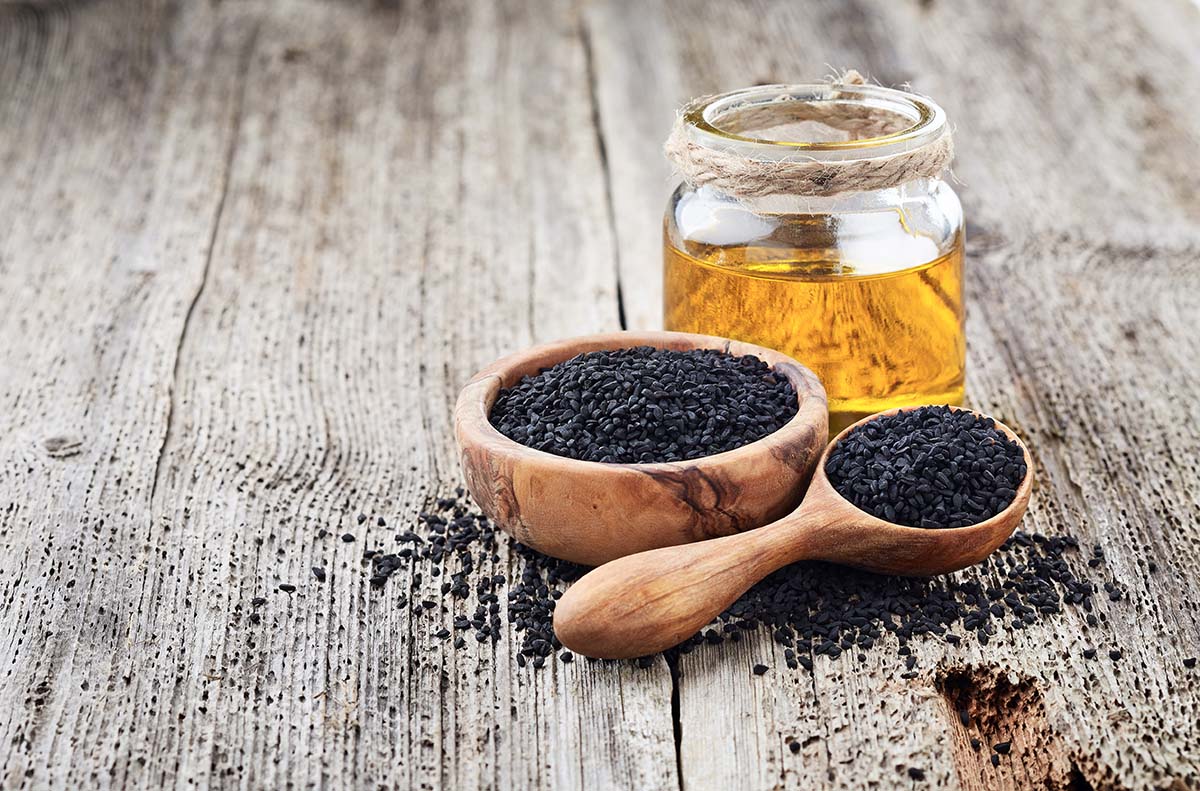Advertisement
10 Black Seed Oil Benefits for Health and Beauty
An oil from a small seed with a lot to offer
Fact-Checked
This article has been written and fact-checked by experts in the field.

Helps fight cancer
Made with the seeds of the Nigella sativa shrub, black seed oil—also known as black cumin oil—has been used for thousands of years for its medicinal powers. Whether taken internally or applied topically, black seed oil offers many science-backed benefits for health and beauty; here are 10 of them.

Black seed oil derives much of its therapeutic properties from a compound called thymoquinone, which works as an antioxidant in the body to protect from free radicals and cell damage that can lead to cancer. Thymoquinone has also been shown to have anti-cancer effects, including the ability to shrink tumors and slow their growth. However, more research is needed to investigate the full cancer fighting potential of thymoquinone and black seed oil in humans.
Acts as an anti-inflammatory

Thymoquinone acts as an anti-inflammatory, reducing pain in the body and reducing the risk of diseases connected to chronic inflammation. Studies have linked black seed oil’s anti-inflammatory powers to reduced joint swelling and stiffness in people with rheumatoid arthritis, improvement in cases of psoriasis, faster wound healing, reduced breast pain associated with the menstrual cycle, and much more.
Helps lung health and breathing

Black seed oil has long been used to treat bronchitis, asthma, and other lung and breathing concerns, thanks to its anti-inflammatory effects. Studies show that taking the oil orally—and in combination with other asthma medications—can help control asthma symptoms, improving coughing, wheezing, and lung function. Black seed oil has also been shown to be helpful in improving lung function of those suffering from COPD when used in combination with prescribed inhalers.
Supports healthy cholesterol levels

Supplements made with black seed oil have been found to help support healthy cholesterol levels by working to lower levels of “bad” cholesterol (LDL) and triglycerides. It has also been found to help boost “good” cholesterol (HDL) when use in combination with aerobic exercise. Check out these tips and foods that can help lower your cholesterol and increase your longevity.
Boosts metabolism

Black seed oil has shown potential to help those with metabolic disorders and obesity. Further, black seed oil supplements have also been shown to help boost glucose metabolism, making it potentially useful for diabetes control. In studies, those with Type 2 diabetes who took black seed oil were found to have lower blood sugar levels—putting them at less risk of suffering from diabetes-related complications.
Improves male fertility

Research has shown that black seed oil can help boost sperm count and motility in men that are suffering from infertility. This benefit is likely due to the oil’s antioxidants, which can protect sperm from damage. Still, more clinical trials are needed to help determine if black seed oil can be recommended as a good treatment for infertility in men. If starting a family is on your mind, check out these other five ways to help support male fertility.
Promotes hair growth

Black seed oil has been linked to reduced hair fall and improved hair growth. The oil’s anti-inflammatory and antioxidant effects have been shown to help those suffering from telogen effluvium—a condition where hairs enter the telogen (rest/shedding) phase early, causing hair thinning. One small study found that black seed oil helped 70 percent of the study’s subjects experience significant improvement in hair thickness after three months of use.
Relieves acne

Thanks to its anti-inflammatory effects, black seed oil can help treat acne and may even work as well as conventional treatments such as benzoyl peroxide. Further, one study showed that, not only did black seed oil provide similar results to benzoyl peroxide in reducing inflammation and the number of acne lesions, but it also caused less adverse side effects. Check out these other herbal remedies for those pesky pimples.
Helps treat vitiligo

Vitiligo is a disorder that causes the loss of pigment in patches on the skin. Black seed oil has been shown to help encourage melanin in the skin to increase pigmentation. One study combining fish oil with black seed oil provided good results in decreasing the size of vitiligo spots. Due to its lack of side effects, black seed oil is particularly useful for treating vitiligo in sensitive areas, such as the skin in the genital region.
Fights allergies

Taking black seed oil daily by mouth has been linked to improved allergy symptoms in those with hay fever. Other research has shown using black seed oil drops in the nose was also helpful at treating symptoms of hay fever, including sneezing, itchy eyes, and stuffy nose. Check out these other seven natural treatments that can help with seasonal allergies.





